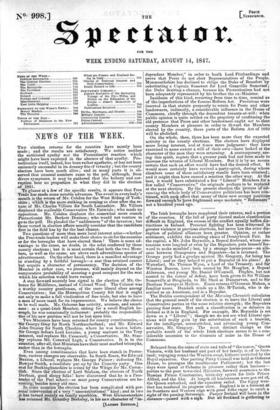The Irish boroughs have completed their returns, and a portion
of the counties. If the lull of party discord makes classification difficult in England, the excess of the conflict equally baffles dis- tinctions in Ireland. Personal fighting has been witnessed in greater violence at previous elections, but never has the utter dis- ruption of political alliances been greater. Opinion, or rather sentiment, exhibits the exulting chaos of Donnybrook Fair. In the capital, a Mr. John Reynolds, a Repeal firebrand, whose pre- tensions were laughed at even by the Repealers, puts himself for- ward to make mischief ;'but, by a strange hocus-pocus—an alli- ance between Orangemen and Repealers—he is returned. The Orange party had a grudge against Mr. Gregory, for being too Liberal; and so they helped to put a Repealer in his place I At Waterford, Mr. Thomas Wyse, a Lord of the Treasury, and Sir Winston Barron, have been ousted by Mr. Meagher, a Repeal Alderman, and young Mr. Daniel O'Connell. Frights, but not carried to the extent of defeat, have been given to Sir William Somerville at Drogheda, to Mr. Shen at Dungarvan, and to Sir Denham Norreys at Mallow. Ennis returns O'Gorman Mahon, a familiar name. Dundalk sends up a Mr: M•Tavish, who is de- scribed as an American, and is a Repealer. The Dublin correspondent of the Morning Chronicle calculates that the general result of the election is to leave the Liberal and Conservative parties in the same relative strength ; the Repealers gaining four seats. But such a classification is as delusive in Ireland as it is in England. For example, Mr. Reynolds is set down as a " Liberal ' ; though we do not see what Liberal opi- nions will really gain by the substitution of such a brawler, for the intelligent, accomplished, and advancing young Con- servative, Mr. Gregory. The most distinct change as the probable result of the whole Irish elections seems to be a con- siderable accession to the elements of noise in the House of Commons.


























